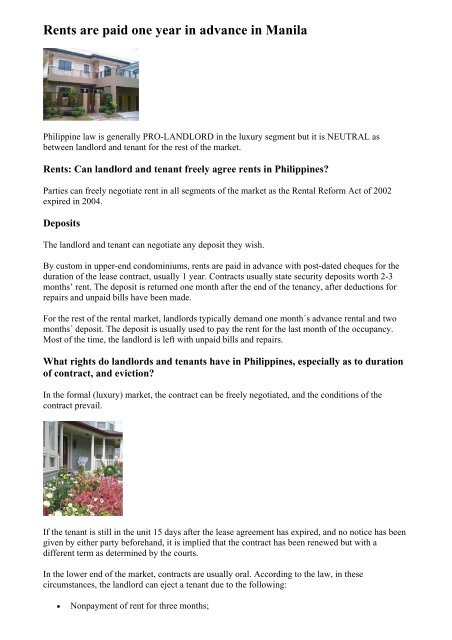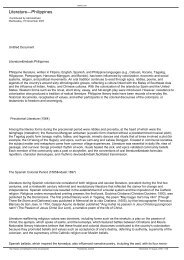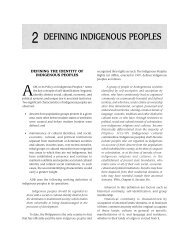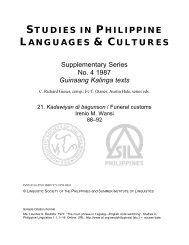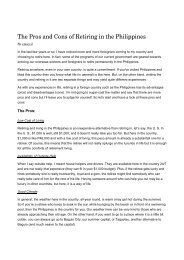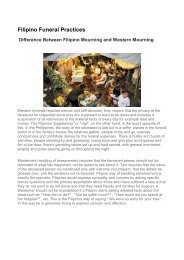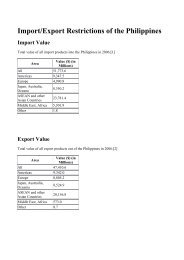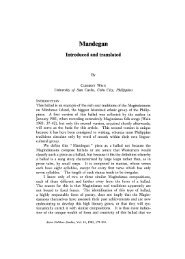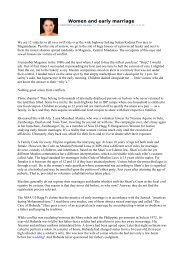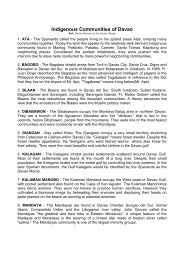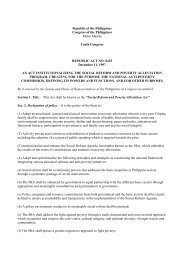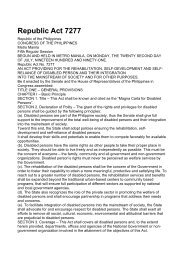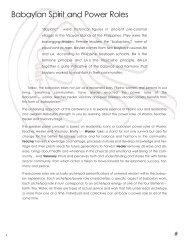Rents are paid one year in advance in Manila - About the Philippines
Rents are paid one year in advance in Manila - About the Philippines
Rents are paid one year in advance in Manila - About the Philippines
Create successful ePaper yourself
Turn your PDF publications into a flip-book with our unique Google optimized e-Paper software.
<strong>Rents</strong> <strong>are</strong> <strong>paid</strong> <strong>one</strong> <strong>year</strong> <strong>in</strong> <strong>advance</strong> <strong>in</strong> <strong>Manila</strong><br />
Philipp<strong>in</strong>e law is generally PRO-LANDLORD <strong>in</strong> <strong>the</strong> luxury segment but it is NEUTRAL as<br />
between landlord and tenant for <strong>the</strong> rest of <strong>the</strong> market.<br />
<strong>Rents</strong>: Can landlord and tenant freely agree rents <strong>in</strong> Philipp<strong>in</strong>es?<br />
Parties can freely negotiate rent <strong>in</strong> all segments of <strong>the</strong> market as <strong>the</strong> Rental Reform Act of 2002<br />
expired <strong>in</strong> 2004.<br />
Deposits<br />
The landlord and tenant can negotiate any deposit <strong>the</strong>y wish.<br />
By custom <strong>in</strong> upper-end condom<strong>in</strong>iums, rents <strong>are</strong> <strong>paid</strong> <strong>in</strong> <strong>advance</strong> with post-dated cheques for <strong>the</strong><br />
duration of <strong>the</strong> lease contract, usually 1 <strong>year</strong>. Contracts usually state security deposits worth 2-3<br />
months’ rent. The deposit is returned <strong>one</strong> month after <strong>the</strong> end of <strong>the</strong> tenancy, after deductions for<br />
repairs and un<strong>paid</strong> bills have been made.<br />
For <strong>the</strong> rest of <strong>the</strong> rental market, landlords typically demand <strong>one</strong> month´s <strong>advance</strong> rental and two<br />
months´ deposit. The deposit is usually used to pay <strong>the</strong> rent for <strong>the</strong> last month of <strong>the</strong> occupancy.<br />
Most of <strong>the</strong> time, <strong>the</strong> landlord is left with un<strong>paid</strong> bills and repairs.<br />
What rights do landlords and tenants have <strong>in</strong> Philipp<strong>in</strong>es, especially as to duration<br />
of contract, and eviction?<br />
In <strong>the</strong> formal (luxury) market, <strong>the</strong> contract can be freely negotiated, and <strong>the</strong> conditions of <strong>the</strong><br />
contract prevail.<br />
If <strong>the</strong> tenant is still <strong>in</strong> <strong>the</strong> unit 15 days after <strong>the</strong> lease agreement has expired, and no notice has been<br />
given by ei<strong>the</strong>r party beforehand, it is implied that <strong>the</strong> contract has been renewed but with a<br />
different term as determ<strong>in</strong>ed by <strong>the</strong> courts.<br />
In <strong>the</strong> lower end of <strong>the</strong> market, contracts <strong>are</strong> usually oral. Accord<strong>in</strong>g to <strong>the</strong> law, <strong>in</strong> <strong>the</strong>se<br />
circumstances, <strong>the</strong> landlord can eject a tenant due to <strong>the</strong> follow<strong>in</strong>g:<br />
• Nonpayment of rent for three months;
• Subleas<strong>in</strong>g <strong>the</strong> unit without <strong>the</strong> written consent of <strong>the</strong> landlord;<br />
• Landlord’s need for <strong>the</strong> property for personal use. Three months’ formal notice must be<br />
given;<br />
• Need of <strong>the</strong> landlord to make necessary repairs. The ejected tenant; however, reta<strong>in</strong>s first<br />
preference to rent <strong>the</strong> same unit.<br />
The tenant can term<strong>in</strong>ate <strong>the</strong> lease agreement at any time. The tenant can also withhold rent<br />
payments, if <strong>the</strong> landlord refuses to make necessary repairs or fails to ma<strong>in</strong>ta<strong>in</strong> <strong>the</strong> tenant <strong>in</strong><br />
peaceful and adequate enjoyment of <strong>the</strong> property leased.<br />
If <strong>the</strong> unit is condemned for demolition, a notice of 15 days is given to <strong>the</strong> tenants to leave <strong>the</strong> unit.<br />
If <strong>the</strong> landlord wishes to evict a tenant, he must file a case <strong>in</strong> court. With<strong>in</strong> 10 days, he can apply for<br />
a permit to reclaim <strong>the</strong> property. The court must decide with<strong>in</strong> 30 days, notwithstand<strong>in</strong>g appeals,<br />
counter appeals, delays, and o<strong>the</strong>r matters. The court would <strong>the</strong>n order <strong>the</strong> Court Sheriff to assist <strong>the</strong><br />
landlord <strong>in</strong> claim<strong>in</strong>g his property.<br />
EVICTION FOR NON-<br />
PAYMENT OF RENT<br />
Duration until completion of 42<br />
service of process<br />
Duration of trial 97<br />
Duration of enforcement 25<br />
Total Days to Evict Tenant 164<br />
Courts: The Lex Mundi Project<br />
How effective is <strong>the</strong> Filip<strong>in</strong>o legal system?<br />
Barangay (town) tribunals mediate <strong>in</strong> most landlord-tenant problems. If <strong>the</strong> problem is not resolved<br />
at <strong>the</strong> town level, <strong>the</strong> parties may go to court and endure a long and expensive trial. But <strong>the</strong> legal<br />
system is cumbersome. In practice <strong>the</strong> landlord’s success <strong>in</strong> evict<strong>in</strong>g a tenant may depend on his<br />
<strong>in</strong>fluence <strong>in</strong> <strong>in</strong>fluenc<strong>in</strong>g <strong>the</strong> police (or local gang members) to apply pressure.<br />
Legislation: Recent changes <strong>in</strong> Filip<strong>in</strong>o landlord and tenant law<br />
The Civil Code of <strong>the</strong> Philipp<strong>in</strong>es [Articles 1654-1688] provides a general guidel<strong>in</strong>e for <strong>the</strong><br />
conditions of lease of rural and urban lands. The owner of <strong>the</strong> land or property, however, should be<br />
wary that <strong>the</strong> law conta<strong>in</strong>s provisions that <strong>in</strong> certa<strong>in</strong> circumstances <strong>the</strong> “custom of <strong>the</strong> place” shall<br />
be followed. For a country with almost 60 ethno-l<strong>in</strong>guistic groups, <strong>the</strong> custom may be unpredictable,<br />
especially <strong>in</strong> rural <strong>are</strong>as.<br />
The Rental Reform Act of 2002 (Republic Act No. 9161) regulates rentals of residential units with<br />
rents not exceed<strong>in</strong>g PHP7,500 (US$141) per month <strong>in</strong> cities, and PHP4,000 (US$75) per month <strong>in</strong><br />
all o<strong>the</strong>r <strong>are</strong>as. It expired <strong>in</strong> 2004 but <strong>the</strong> provisions <strong>are</strong> generally still followed at <strong>the</strong> lower<br />
segment of <strong>the</strong> rental market.<br />
Ref.: http://www.globalpropertyguide.com/Asia/Philipp<strong>in</strong>es/Landlord-and-Tenant


